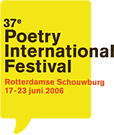Poet
|
Durs Grünbein 1962-... country: Germany language: German |
(Dresden, 1962) urgently requested to be left out of the Flemish magazine Deus ex Machina which was planning a special on literature from the former D.D.R. a few years ago. In an interview with Der Spiegel he commented briefly and angrily: 'I was lost to the D.D.R. the moment I was born.' His début volume Grauzone morgens (1988) was among the last testimonies to come from the 'ghetto of a lost generation', the generation born and raised in the cardboard utopia of communist East Germany. Grünbein has not for a moment mourned the loss of the socialist fatherland, yet labours under the heritage of desolation, isolation and disillusionment it left in its wake. 'It's a long time ago, and look, I'm still here,' he says in 'Vita brevis', a poem from his recently published collection Nach den Satiren. After the fall of the Berlin Wall, Durs Grünbein became one of the first writers of the reunified Germany. His personal life clearly reflects this: he lives with wife and daughter in East Berlin, but works in a rented room in the West. In the past ten years he published five books of poetry, a collection of essays, and translations of John Ashberry, Samuel Beckett, Henri Michaux and others. He received many awards for his work, including the 1995 Georg Büchner Prize, Germany's most prestigious literature prize. The award was seen as a symbolic gesture on the part of the jury: a determined bet on the young talent of a new Germany. Grünbein's third collection, Den teuren Toten (1994), is a series of 'reports on the death of insignificant people', written in the form of ancient epitaphs. Grünbein has meanwhile inspired a following in Denmark of people composing epitaphs based on his model. A Dutch translation of the entire collection will be published in time for the festival. Are we to see a worldwide revival of the art of the lyrical epitaph, as a vehicle for social or philosophical comment? Poets: |


